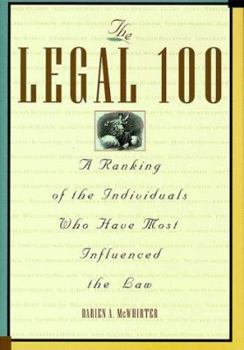The Legal 100
In vivid biographical sketches, McWhirter chronicles the lives and accomplishments of the individuals who have most influenced the law in the last 4,000 years. This description may be from another edition of this product.
Format:Hardcover
Language:English
ISBN:080651860X
ISBN13:9780806518602
Release Date:January 1998
Publisher:Citadel Press
Length:416 Pages
Weight:2.30 lbs.
Dimensions:1.4" x 7.3" x 10.3"
Customer Reviews
2 ratings
A Short Guide to Legal History
Published by Thriftbooks.com User , 18 years ago
The author is a law professor, attorney, and social scientist (Ph.D. in political science). The 100 people in this book were selected as those who had "the most impact on" the evolution of Anglo-American law. Not all of the people listed here are lawyers. Lawyers have played an important role in bringing democracy, individual freedom, and economic prosperity; sometimes at great personal sacrifice. This list was derived from law professors at American law schools. The ranking is by the author alone. The 'Preface' explains his choices. Most of the people listed here led lives that could make interesting films. This book is written for a general audience. Placing these people in historical order would be more educational. The 'Introduction' provides "A Brief History of Western and Anglo-American Law" in 25 pages, the most important part of this book. The beginnings of Western civilization are generally attributed to the Sumerians, the land between the Tigris and Euphrates. Hammurabi's code is the oldest complete law code (p.2). The Hittite law code is another complete corpus juris. Modern law codes differ in degree rather than kind. They are concerned with interpersonal relationships and property regulations. The Jewish Bible reflects Babylonian law, and these concepts were carried over to Christianity. The problems of Athens resulted in rewritten laws by Solon. The new Roman republic resulted in new laws, the Code of the Twelve Tables, which are lost to us (p.4). The Romans invented the idea of a judge and a lawyer for each side. The idea of natural law from classical times informed the English common law which is in use today (p.5). Justinian reorganized the laws for the modern times of the sixth century AD; this formed the basis for the laws on the continent. The 'Dark Ages' saw the codification of feudal law, where leaders gave goods to supporters in return for loyalty (this describes politics today). The Roman Catholic Church developed its Canon Law which influenced national laws (p.6). Kings attacked the jurisdiction of Church courts to expand their own power (and collect the fines). Lord Chancellors developed the idea of doing what was fair and equitable for people (p.9). The ideas of Locke and Montesquieu are reflected in the U.S. Constitution. The American Revolution is marked by the Declaration of Independence; most of the signers were lawyers (p.12). Three brilliant lawyers worked out compromises for the Republic (p.13). [McWhirter doesn't tell you that the "right to privacy" was invented to stop publishing photographs of the rich and powerful (p.18). And that corporations like the Rockefellers and Carnegies were behind Prohibition (p.16).] Regulation of business was started by Disraeli when the excesses of capitalists harmed the powerful British aristocracy (p.19) [who still own most land in England]. Theodore Roosevelt passed anti-trust and regulation of giant monopolies. The 1950s and 1960s saw new protections for people's rights (p
An interesting look at the figures who shaped jurisprudence
Published by Thriftbooks.com User , 23 years ago
It offers a top 100 legal list of attorneys, jurists, judges, statesmen, philosophers and political theorists through the ages that have a profound influence on Western Jurisprudence. The Legal 100 places a particular emphasis on Anglo-American law. I guess this book is fairly balanced ideologically. Though, it has quite a few figures who organized the law for the purpose of 'legal plunder.' Granted, they've had a profound influence on contemporary law too. It is probably one of those books like Black's Law Dictionary, that every student of law should have. My only gripe is that the classical liberal statesmen and economist, Frederic Bastiat, was not included.Sampling of the top 50: 1. James Madison; 2. Alexander Hamilton; 3. John Marshall; 4. Cicero; 5. Daniel Webster; 6. Clarence Darrow; 7. William Mansfield; 8. Thomas Eskine; 9. Edward M. Hall; 10. Earl Warren; 11. Edward Coke; 12. Francis Bacon; 13. William Blackstone; 14. James Kent; 15. George Wythe; 16. John Locke; 17. Montesquieu; 18. Olier Wendell Holmes; 19. Louis D. Brandeis; 20. John Marshall Harlan; 21. Aristotle; 22. Jeremy Bentham; 23. John Stuart Mill; 24. John Austin; 25. Karl Marx; 26. Earl Rogers; 27. Charles Evans Hughes; 28. Hugo Black; 29. William O. Douglas; 31. Hammurabi; 32. Solon; 33. Justinian I; 34. Henry II; 35. Edward I; 36. Napoleon Bonaparte; 37. Benjamin Disraeli; 38. William Gladstone; 39. Theodore Roosevelt; 40. Woodrow Wilson; 41. Franklin D. Roosevelt; 42. Lyndon Baines Johnson; 43. Christopher Langdell; 44. Roscoe Pound; 45. Benjamin Cardozo; 46. Lemuel Shaw; 47. Mary Wollstonecraft; 48. William Godwin; 49. Mohandas Gandhi; and 50. Susan B. Anthony. Other luminaries included are: Thurgood Marshall Edmund Burke, Patrick Henry, Thomas Jefferson, Joseph Story, John C. Calhoun, Otto von Bismark and V.I. Lenin.






